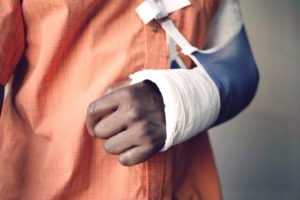Tajwid is an Arabic term that means “beautification.” It refers to the science and art…
What Should I Do? – How Should I Perform Wudhu in a Cast?
 I. Details about the situation
I. Details about the situation
It was a hot summer day and Hamid was having fun playing basketball with his friends. While playing, Hamid jumped up to get a rebound and ended up falling and injuring his forearm. He was immediately taken to the emergency room where it was determined that he had severely fractured his forearm and would have to wear a cast for several weeks. Hamid returned home from the hospital that evening and went to perform wudhu at the time of maghrib. After washing his face, he glanced down at his forearm in the cast and wondered how he would wash it. What should he do?
II. Background
The Islamic code of law covers every circumstance and situation in life, and includes alternative rulings for the duty-bound person who is subjected to harm (dharrar) or unbearable hardship (haraj) when fulfilling a particular obligation. As such, when a person gets injured like Hamid, it is not always possible to remove the cast or wash underneath it, and performing wudhu on the injured part can entail harm or unbearable hardship. In such a case, the duty-bound person can perform wudhu al-jabirah (i.e. wudhu over the splint/cast).
Ruling
If one of the body parts on which wudhu is performed is injured or there is a broken bone, then wudhu al-jabirah is permissible if it is covered with a splint or cast and it is harmful to uncover or excessively unbearable or difficult. In such a case, the person must wash/wipe as much of the body part around the cast as possible and wipe over the cast based on obligatory precaution. The complete rules about wudhu al-jabirah can be found at here.
IV. Action
If Hamid cannot remove the cast to perform wudhu or if it is excessively unbearable and difficult to do so, then he must wash his hands as he normally would, wash as much of the broken forearm around the cast as possible, and instead of washing the cast, he must only wipe on it based on obligatory precaution.
Related Posts
- Tajwid – A Guide to Quranic Recitation
- Video: I.M.A.M. at Home – In God’s Remembrance – Lessons from Sura al-Muzzamil
https://www.youtube.com/embed/d-pCv-6KSzQ Host: Shaykh Faiyaz Jaffer Chapter 73 of the Holy Quran offers us many unique insights…
- Video: Let’s Talk Religion: Ep. 11 – Servanthood to God in All Times – Advice of the Ahl al-Bayt (p)
https://www.youtube.com/embed/rFGZpqVoS7c Host: Shaykh Dr. Mehdi Hazari Episode Notes: A true servant of God is aware that life…

Leave a Comment:
You must be logged in to post a comment.